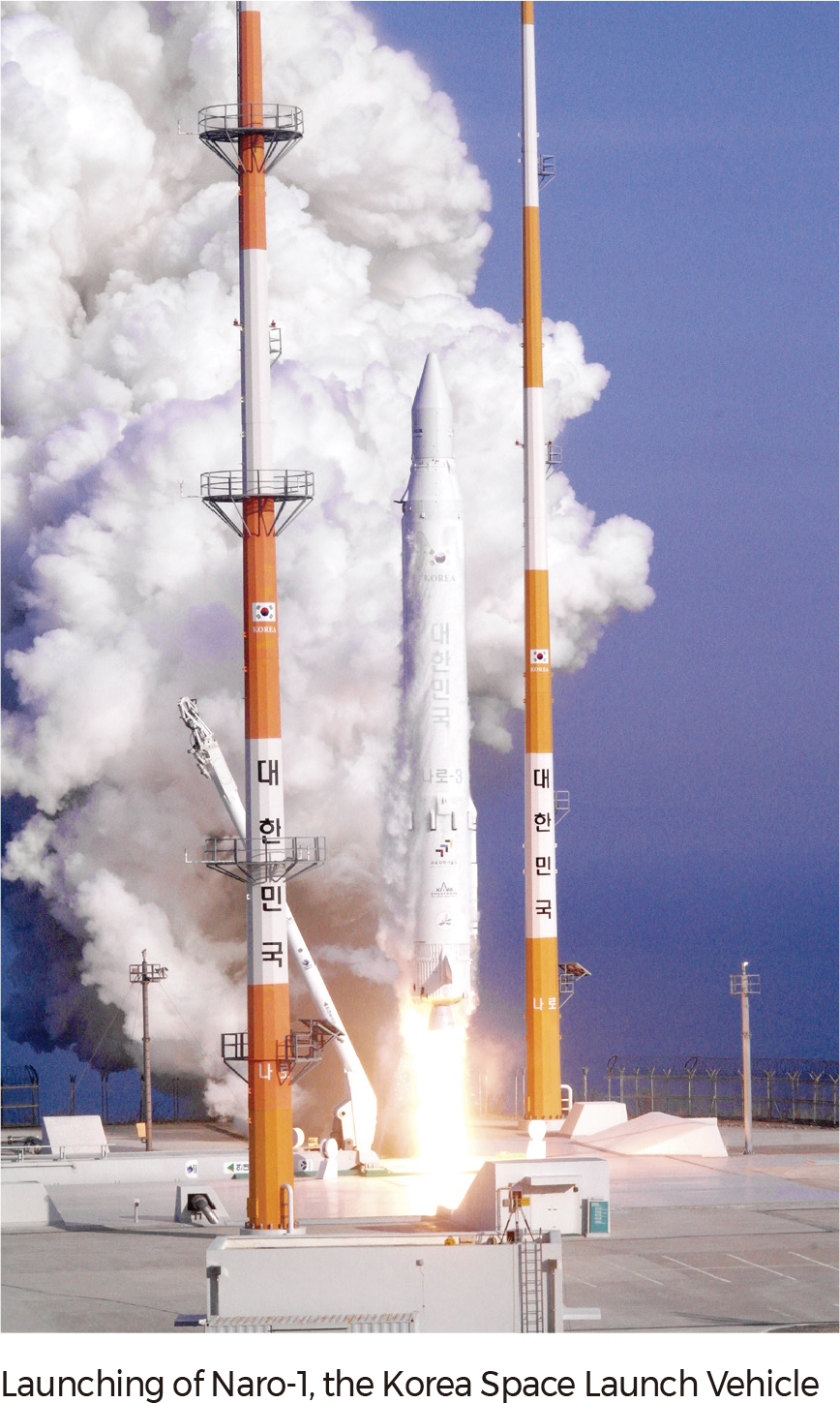Comprehensive Edition 2022
Many environmental problems related to the ocean and atmosphere—such as climate change, sea level rise, and marine plastic debris—are complex and global in nature and therefore require international cooperation among many countries. Korea has been active both at home and abroad in the scientific study of oceanic and atmospheric phenomena. The Korea Ocean Observing Network (KOON) is designed to manage and monitor ocean conditions within Korea’s sovereign marine areas. It consists of tidal stations, buoys, current stations, and an ocean research platform. The data generated by KOON sites are used to help monitor environmental changes and to plan for disaster mitigation.
Korea partners with many overseas laboratories and institutes that research marine environments. These organizations develop initiatives related to fisheries monitoring, sustainable planning, and marine ecosystem preservation. Korea is also a world leader in the science of climate change, working closely with many international organizations, including the World Meteorological Organization (WMO). The Korea Meteorological Administration (KMA) has been an executive council member of the WMO since 2007. KMA helps with education initiatives, the coordination of scientific projects, and international collaborations. Monitoring of the ocean and atmosphere is enhanced by the use of satellites. Korean satellite capabilities have made great progress since the 1990s. Many satellites have been launched to help with scientific endeavors.
Conducting scientific research expeditions in oceanic and polar areas well beyond its borders represents an important step in Korea’s contribution to the global scientific community. In 2002, Korea established the Dasan Arctic Research Station on Spitsbergen, an Island in the Svalbard Archipelago (a group of islands). The station, which was set up to explore the Arctic environment and resources, performs multiple roles as an observation base for a variety of research projects. Korea operates two research stations in Antarctica: the King Sejong Station and Jang Bogo Station. The research agenda at King Sejong Station primarily focuses on climate change and polar environments, such as atmospheric conditions in the Antarctic region, its geologic features, waters, and organisms. With the construction of the Jang Bogo Station in 2014, Korea has extended the scope of research to include such additional fields as paleoclimatology and paleoenvironments, along with expeditions for meteorites.
Korea, with its advanced technological capabilities, has a strong commitment to research contributions that deal with such global issues as climate change and the degradation of the global environment. Its continued operation of research stations worldwide is a testament to this commitment.
Supporting Developing Countries Projects and Invitation & Training Programs •Education Program for Foreign Forecasters (1998-2005, 2014-) •Education Program for the Operation of the Weather Radar and Data Utilization (2012-) •KMA built the Korea-China Joint SDS (Sand & Dust Storm) Monitoring Network (2003-2006, 2006-2008, 2014-2018) •KMA worked out the master plan for the advancement of the national meteorological system in Myanmar. (2015-2016) •KMA modernized the meteorological disaster monitoring system of Myanmar. (2017-2019) •KMA modernized the meteorological disaster monitoring system of Vietnam. (2014-2016) •KMA established the automatic weather observation system of Mongolia. (2017-2019)
Establishing Global Leadership •Korean candidate elected member of the WMO Executive Council. •KMA approved by the WMO to establish the WMO Lead Center for Long-Range Forecast Multi-Model Ensemble in Korea. •KMA approved by the WMO to establish the Global Information System Center (GISC) in Seoul. •KMA appointed government department representing Korea for the Intergovernmental Panel on Climate Change (IPCC). •KMA approved by the WMO to establish the Global Atmosphere Watch (GAW) World Calibration Center for SF6 (Sulfur Hexafluoride). •Korean candidate elected to the vice-presidency of the WMO Commission for Atmospheric Sciences (CAS). •KMA has implemented joint research projects with the international community.
Educational Training Program for Developing Countries •Foreigner Forecaster Course (1998-) •Korea ASEAN Training Workshop (2002-2011) •Meteorological Service Enhancement Course using Information Communication Technology (ICT) (2006-) •Climate Prediction Experts Ability Cultivation Course (2006-2008) •Numerical Forecast Training (2007-) •COMS Satellite Data Analysis Training Course (2007-) •Africa Disaster Management Ability Cultivation Course (2009-2012) •Korea-China Asian Dust Joint Observation Network Operator Education (2010-) •Weather Radar Operation and Data Utility Course (2012-)
Infrastructure Support Program for Developing Countries •The Construction of Korea-China Joint Observation Network (2003-2008) •The Construction of Sri Lanka Meteorological Administration PC Cluster Numerical Forecasting System (2005) •The Construction of the Philippines* Disaster Prevention Early Warning System •The Modernization of Mongolian Meteorological Administration Climate Data Restoration and Management (2008-2009) •The Establishment of East Africa Region Climate Center (East Africa Climate Prediction Application Center 2009-2012) •The Construction of Vietnam Typhoon Analysis and Forecast System (2010-2012) •The Construction of Sri Lanka Satellite Data Reception System (2010-2012) •The Modernization of Vietnam Meteorological Disaster Monitoring System (2014-2016) •The Establishment of Myanmar Meteorological Advancement Master Plan (2015-2016)
Memorandum of Understanding (MOU) Signing •As of August 2016, MOUs Signed with 17 Countries and Five International Agencies. •Numerical Forecasting, Experts Exchange, Education Enhancement, Earthquake, Asian Dust, Satellite, and Other
Numerical Forecasting Data Support •The Atmospheric Pressure 500 hPa Geopotential Height Field, 200 hPa Isotach, and Other; Forecast Weather Chart •30 Countries /358 Cities Prediction Data for Temperature, Wind, and Precipitation
Overseas Dispatch •Switzerland WMO Asia Southwestern Pacific Region Office •King Sejong Station, Antarctica •Qatar Meteorological Administration •Meteorological Advisor Dispatch: Kenya, Mongolia, Vietnam, Malaysia, Senegal, Uzbekistan, Rwanda |




